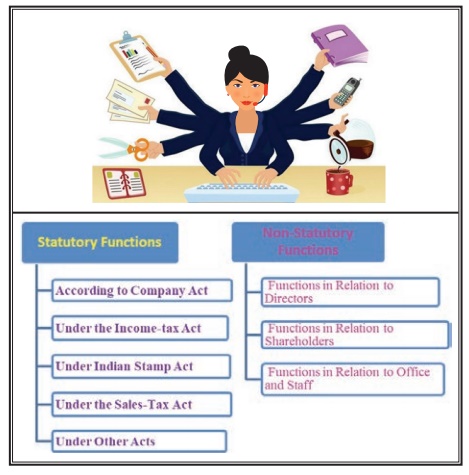Chapter: 12th Commerce : Chapter 28 : Company Law and Secretarial Practice : Company Secretary
Functions/ Duties of Company Secretary
Functions/ Duties of Company Secretary
Functions of the Company Secretary may be discussed under
two headings:
(i) Statutory Functions or Duties and (ii) Non-statutory
Functions or Duties.

01. Statutory Functions
As the principal officer of the company, the
secretary must observe all the legal formalities in respect of the provisions
of the Companies Act and other laws (e.g., Income-tax Act, Stamp Act, Sales-tax
Acts, etc.) which have a bearing on the activities of the company.
According to Companies Act 2013
(i) To sign document and proceedings requiring
authentication by the company
(ii) To maintaining share registers and register of
Directors and of contracts
(iii) To give notice to register for increase in
the share capital
(iv) To deliver share certificate of allotment
within 2 months after transfer
(v) To sign and send annual return
(vi) To make a statutory declaration for receiving
certificate of commencement of business
(vii) To send notice of general meeting to every
member of the company
(viii) To make statutory books
(ix) To prepare minutes of every general meeting
and board meeting within 30 days
(x) To file a resolution with the registrar
(xi) To assist in preparing the statement of
affairs in a winding up
Under the
Income-tax Act: He is responsible for deduction of requisite income tax from salaries of employees,
dividends and interests payable. He has to ensure that the tax deducted is
deposited at government treasury. Secretary has to submit and verify various
forms for timely filing of income tax returns to the authorities in accordance
with the law. He has to see that the certificate of Tax Deducted at Source
(TDS) is issued to every employees and shareholders.
Under
Indian Stamp Act: The company secretary
has to ensure that whether proper
stamps are affixed on the company’s documents like
letter of allotment and share certificate or not. He is also complying with
Minimum Wages Act, Industrial Disputes Act, Employee State Insurance Act etc.
Under the
Sales-Tax Act: He must ensure
timely submission of tax returns to the Sales-tax authorities and payment
of tax.
Under
Other Acts: He must see that the provisions of any other Act applicable to the company, e.g.,
Foreign Exchange Regulation Act, Industries (Development and Regulation) Act,
and Rules, are also complied with. Where the company is carrying on
manufacturing business, he must also comply with the provisions of the
Factories Act, Payment of Wages Act, Industrial Disputes Act and other labour
laws.
02. Non-Statutory Functions
Secretary has to discharge non-statutory functions
in relation to directors, shareholders and office and staff. These functions
are briefly mentioned.
(1) Functions as agent of directors;
(2) Functions towards shareholders;
(3) Functions towards office and staff.
(1) Functions in Relation to Directors
A company secretary acts under the full control of
the board of directors and carry out the instructions of the directors. The
secretary provides necessary advice and information to the board to formulate
company policy and arrive at decisions. It is the secretary’s duty to implement
the decisions taken by the board of directors.
The duties of the secretary includes arranging
board meetings, issuing notice and preparing agenda of such meetings, recording
the attendance of the directors and the minutes and resolutions of the meeting
in consultation with the Chairman. He maintains all important correspondence,
files, documents and records in the board office.
(2) Functions in Relation to Shareholders
The company secretary must serve in the best
interests of the shareholders. He also must safeguard the shareholders’
interest. Under the Companies Act 2013, secretary should act as link between
the board of directors and the shareholders and also ensure that the shareholder’s
rights are violated. He has to arrange the issue allotment letters, call
letters, letters of regret, share certificates, share warrants to Shareholders.
Besides he has to issue notices and agenda of all meeting of shareholders and
also send replies to the inquiries and complaints of the shareholders on behalf
of the board of directors.
(3) Functions in Relation to Office and Staff
The Secretary is the kingpin of the
wholecorporate
machinery. He is responsible for smooth functioning of the office work. He
exercises an overall supervision, control and co-ordination of all clerical
activities in the office.
Related Topics